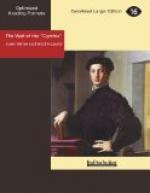“Tell me,” asked the doctor, “who is the best pupil?”
“Erik Hersebom!” answered fifty youthful voices unhesitatingly.
“Ah! Erik Hersebom. Well, Erik, will you come here?”
A young boy, about twelve years of age, who was seated on the front row of benches, approached his chair. He was a grave, serious-looking child, whose pensive cast of countenance, and large deep set eyes, would have attracted attention anywhere, and he was the more remarkable, because of the blonde heads by which he was surrounded. While all his companions of both sexes had hair the color of flax, rosy complexions, and blue eyes, his hair was of deep chestnut color, like his eyes, and his skin was brown. He had not the prominent cheek bones, the short nose, and the stout frame of these Scandinavian children. In a word, by his physical characteristics so plainly marked, it was evident that he did not belong to the race by whom he was surrounded.
He was clothed like them in the coarse cloth of the country, made in the style common among the peasantry of Bergen; but the delicacy of his limbs, the smallness of his head, the easy elegance of his poise, and the natural gracefulness of his movements and attitudes, all seemed to denote a foreign origin.
No physiologist could have helped being struck at once by these peculiarities, and such was the case with Dr. Schwaryencrona.
However, he had no motive for calling attention to these facts, and he simply proceeded to fulfill the duty which he had undertaken.
“Where shall we begin—with grammar?” he asked the young lad.
“I am at the command of the doctor,” answered Erik, modestly.
The doctor then gave him two or three simple questions, but was astonished to hear him answer them, not only in the Swedish language, but also in French and English. It was the usual custom of Mr. Malarius, who contended that it was as easy to learn three languages at once as it was to learn only one.
“You teach them French and English then?” said the doctor, turning toward his friend.
“Why not? also the elements of Greek and Latin. I do not see what harm it can do them.”
“Nor I,” said the doctor, laughing, and Erik Hersebom translated several sentences very correctly.
In one of the sentences, reference was made to the hemlock drunk by Socrates, and Mr. Malarius asked the doctor to question him as to the family which this plant belonged to.
Erik answered without hesitation “that it was one of the family of umbelliferous plants,” and described them in detail.
From botany they passed to geometry, and Erik demonstrated clearly a theorem relative to the sum of the angles of a triangle.
The doctor became every moment more and more surprised.
“Let us have a little talk about geography,” he said. “What sea is it which bounds Scandinavia, Russia and Siberia on the north?”




